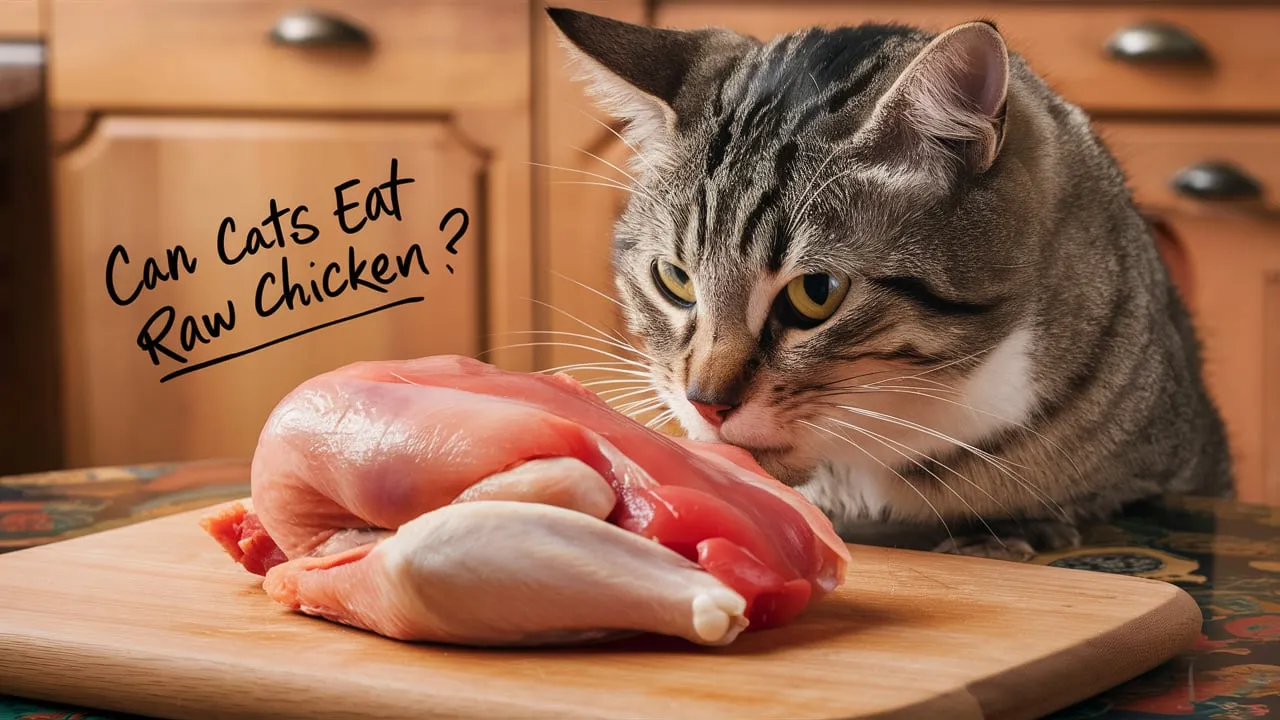Cats are obligate carnivores, creatures whose bodies are specifically designed to function best on a meat-based diet. This means their nutritional needs revolve around high-quality, animal-sourced proteins. Chicken, a popular protein source for humans, is often a favorite among felines as well. Packed with essential nutrients, it provides them with the strength and energy they crave, bolsters their immune system, and even aids in cell and tissue repair. But the question remains: can cats safely consume raw chicken? While the feline desire for this protein-rich meat might be undeniable, the answer isn’t a simple yes or no. Let’s delve deeper into the potential benefits and drawbacks of feeding your cat raw chicken.
Can Cats Eat Raw Chicken: Initial Thoughts

The natural world paints a clear picture: cats are hunters. They stalk, pounce, and devour their prey raw – a testament to their evolved ability to thrive on uncooked meat. This instinctive behavior fuels the belief that domesticated cats share this biological adaptation. From this perspective, the initial answer to the question of whether cats can eat raw chicken seems like a resounding yes. After all, raw chicken is a protein powerhouse, brimming with vitamins and minerals, and inherently digestible for felines. However, the world of feline nutrition is rarely black and white. The topic of raw food diets for cats can be a controversial one, with a multitude of factors to consider before making an informed decision for your furry friend.
Can Kittens Eat Raw Meat?
While kittens, like their adult counterparts, are natural-born carnivores with digestive systems designed for raw meat, introducing it into their diet requires caution. Sure, they can technically eat it, but it’s not as easy as tossing them scraps from the fridge. Their young bodies are still developing and more susceptible to harmful bacteria and parasites that can be present in raw meat. The key lies in ensuring the meat is exceptionally fresh and of the highest quality. Remember, raw meat shouldn’t be their sole source of sustenance. A balanced diet that considers their delicate digestive needs is crucial for healthy growth and development.
The raw chicken diet debate
The very notion of feeding cats a raw chicken diet ignites a firestorm of debate. Proponents champion it as a return to nature, allowing cats to consume what their bodies are supposedly optimized for. After all, their wild ancestors wouldn’t be whipping up gourmet meals in miniature kitchens. This “natural” approach is further bolstered by claims of potential health benefits associated with a raw meat diet, including improved digestion and urinary health, sparkling oral hygiene, increased energy levels, and even weight management. However, it’s crucial to recognize the vast differences between a wild cat’s freshly caught prey and the raw chicken found at your local supermarket. The domesticated feline’s diet lacks the control and freshness that comes with hunting, introducing potential health risks we’ll delve into next.
Potential risks of raw chicken
While the allure of a natural diet might be enticing, the reality of feeding your cat raw chicken is not without its risks. One of the most concerning issues is the presence of parasites and bacteria. Raw chicken can harbor these harmful organisms, posing a potential threat to both your feline friend and yourself. Cats might have a natural advantage due to their shorter digestive tracts and higher stomach acidity, but this doesn’t guarantee immunity. To minimize contamination risks, purchasing fresh, high-quality raw meat from reputable sources is crucial. Always handle the meat with clean hands and thoroughly disinfect any surfaces that come into contact with it. Another potential pitfall is nutritional deficiency. While chicken is a great source of animal protein, it falls short in providing all the essential nutrients your cat needs to thrive. A diet solely reliant on raw chicken can lead to deficiencies. Therefore, a well-balanced diet formulated with all the necessary vitamins, minerals, and amino acids is recommended to ensure your cat’s long-term health. Finally, there’s the risk associated with bones. While raw bones are less likely to splinter compared to cooked ones, they can still cause choking or internal injuries if ingested. Weighing the potential benefits against these risks is crucial before deciding to incorporate raw chicken into your cat’s diet.
The Daily Raw Chicken Query
The question of whether a daily raw chicken diet is suitable for your feline friend is a common one, especially for those considering a more natural approach to cat nutrition. While proponents often tout potential benefits like improved breath, shinier fur, and better digestion, daily raw chicken is generally not recommended. Remember, a balanced diet is key, and raw chicken alone lacks the necessary mix of vitamins and minerals essential for optimal health. To ensure your cat thrives, opt for fresh, high-quality chicken from a reputable source, and remember to portion it appropriately based on your cat’s weight and specific dietary needs. Consulting your veterinarian before introducing any major dietary changes, especially involving raw meat, is always advisable. They can help create a personalized plan that addresses your cat’s unique requirements and minimizes any potential health risks.
Conclusion
With information of Infor Cats. While cats can technically process raw chicken, the potential downsides cannot be ignored. The risk of bacterial contamination, nutritional deficiencies, and choking hazards requires careful consideration. Before making any drastic changes to your cat’s diet, consulting your veterinarian is paramount. They can assess your cat’s individual needs and advise on the safest and most balanced approach to incorporating raw chicken, if appropriate. Remember, a happy and healthy cat is a purring companion, and their well-being should always be the top priority. So, proceed with caution, prioritize veterinary guidance, and ensure any raw chicken is a thoughtful addition to, not the sole foundation of, your feline friend’s diet.

Related Post
What Is Carrageenan In Cat Food?
6 Types Of Ingredients To Avoid In Cat Food
Can Cats Eat Popcorn? Toxicity And Nutrition Information